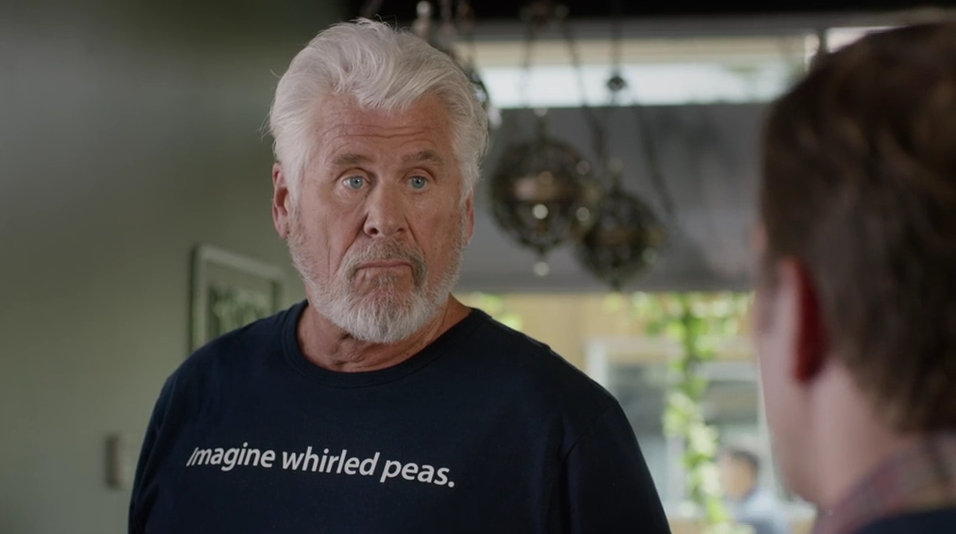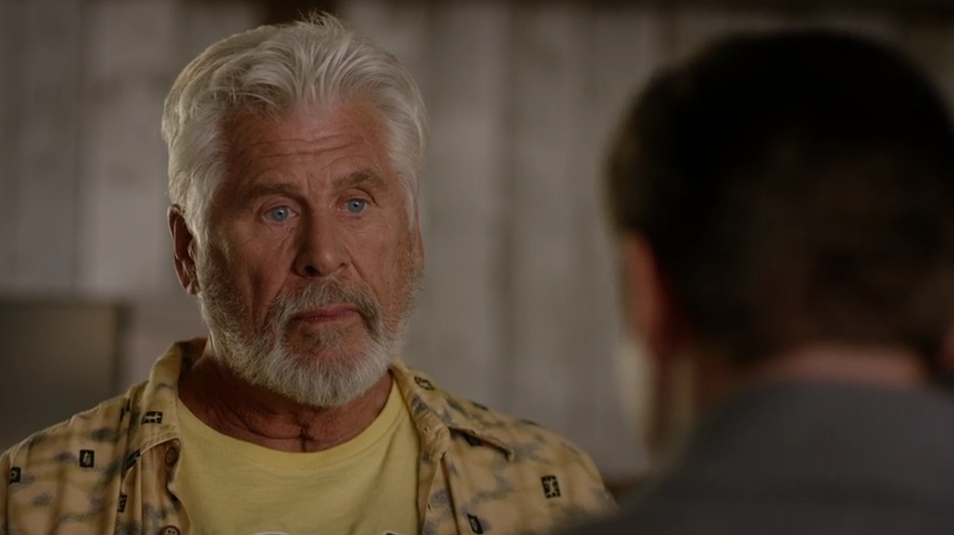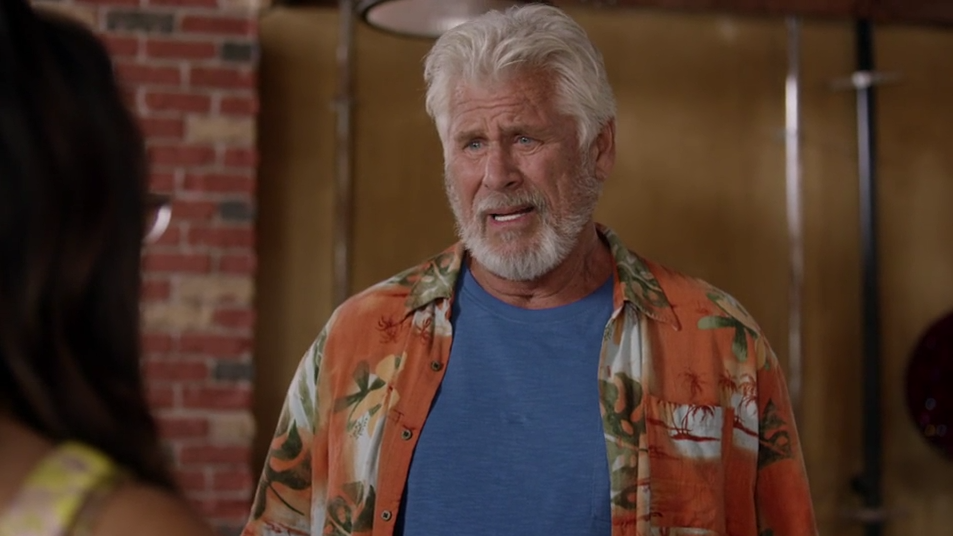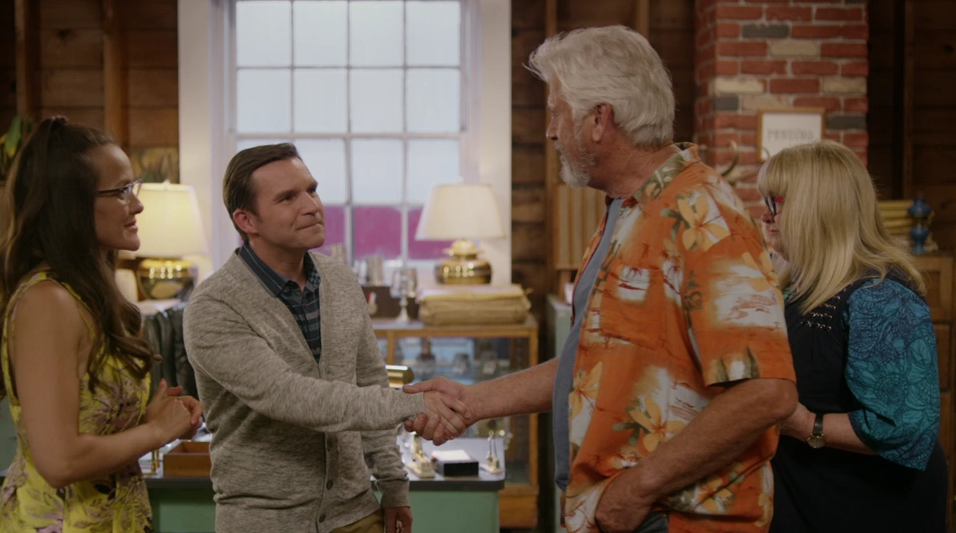It's a weird question, and probably more a revelation of my lack of knowledge about what the term "Hippie" actually means and what it encompasses than anything. Fortunately for me, with the internet at my fingertips, it wasn't long until I ascertained a solid definition:
"...a person, especially of the late 1960s, who:
- rejected established institutions and values;
- sought spontaneity, direct personal relations expressing love, and expanded consciousness;
- often expressed externally in the wearing of casual, folksy clothing and of beads, headbands, used garments, etc."
And then it hit me: Bill Haywith is a hypocrite. Or, at the very least, a man living out of alignment. His philosophy and his actions are in stark contradiction throughout Signed, Sealed, Delivered: Home Again. While very much a "hippie" externally, through his appearance and other details sprinkled throughout the film, his behavior towards Norman points to an internal disconnect which begins to outwardly erode the "peace and love" mentality we've come to associate with his generation. By examining this disconnect between his "hippie" philosophy, and his apparent conflict with Norman, we get insight into the mind (and heart) of Bill Haywith.
Totally Hippie
On a more philosophical level, though, Bill also bucks the establishment in his lament of Wally's Wacky Waffle World, and reveals a moment in which he opted for "direct personal relations expressing love" as he recounts telling Sunny "the only sunrise we're going to see today is the sun in your eyes" a way of saying "I love you without actually saying [it]."
But it's the element of "expanded consciousness" where things start to get a little murky. His t-shirt challenges us to "Imagine whirled peas" ("imagine world peace" for anyone who might not have caught the play on words), but when it comes to Norman, not only does his field of thought seem to narrow, it produces anything but peace.
Not So Hippie
This line really encompasses the two areas in which Bill goes from "hippie" to "hypocrite." The value he placed on the ring, and his focus on what "he imagined" for Rita, are the primary lenses through which we get a picture of how Bill's "expanded consciousness" narrowed, and see exactly how things went wrong.
The Ring Thing
If Hippie's place little or no value on material objects, Sunny's blended bifocals should have been no big deal. By extension, the lost ring should have, technically, also been no big deal. What should have taken precedence was Norman's intention to marry her, and the connection between he and Rita underlying that commitment. After all, marriage (an "established institution" which, by definition, Bill should have rejected, but clearly engaged in by marrying Rita's mother), is about so much more than just the ring. But by fixating on something superficial, Bill excused himself from having to look any deeper at Norman and Rita's connection.
| Perhaps if Norman losing the ring was the first in a string of serious red flags that presented themselves as Bill got to know Norman, it might have made more sense. But the truth of the matter is, it seems from the moment Bill heard the ring was AWOL, he began to apply strict scrutiny to everything from Norman's "tummy issues" to his mental state, and rejected every attempt by Norman to connect with him. It's quite the extreme behavior for a rift that, by all accounts, shouldn't have even existed if Bill had adhered to his core philosophical principles. |
The ring debacle, however, is only a symptom of a much deeper internal conflict, which, unfortunately, manifests itself in Bill's behavior towards Norman.
It's very clear Bill had some sort of picture of with whom Rita should be spending the rest of her life. In this picture, there's something to be said about the kind of man that loses an engagement ring. Furthermore, Rita's suitor doesn't lose her ring, and, most likely, doesn't blend his wife's bifocals. This is dangerously narrow-minded, non-specific (and non-hippie) criteria. It's the tell-tale sign of a father with limited perspective. What is clear is that Norman doesn't meet Bill's self-imposed standard, perhaps prompting, and even permitting his behavior and aloofness towards Norman throughout Home Again.
| Notice that Bill's image also doesn't have any basis in what Rita sees as being her ideal life partner. Shane was right, "Father's want what's best for their daughters," but the caveat is that what each the father and daughter envision might not match. Here, Bill's vision lacks any real definition, and what he does cite is arbitrary, and arguably superficial. Rita's definition, however, was very specific, and the detailed picture she painted not only spoke of Norman's heart, but also provided a mirror for Bill that was just enough to convict him about his behavior. |
Hope For The "Hypocrite"
This reality check was critical to how Bill perceived Norman when he returned to the DLO with Rita and Sunny that evening to re-propose. Not only did Norman challenge Bill's assumptions about what happened with the ring, he used its construction as an owl to express the qualities in Rita with which he fell in love, qualities which Norman attributed Bill with instilling. What Norman sees in Rita clearly extended beyond the ring, and his words to her created a connection with Bill's heart where Rita is concerned. The impact was immediately clear when Bill extended his hand and, with a simple "nice job," welcomed Norman to the family.
| We don't know it until the next evening, but Norman's "direct personal...expression [of his] love" for Rita also reminded Bill of his values. Bill's admission, "You teach your kid to love, and then you act like a jerk when they go out and do it" expresses his recognition that he actively violated this specific principle in particular, for which he apologized to Norman for "being so hard on him." Reconciling with Norman, Bill's actions and values once again realigned. |
Of course, looking at Bill's "hippie" philosophy is only one---purposely "narrow"---angle through which we can understand his struggle throughout Home Again. Thursday, we'll see Bill from another side.
Figuring Him Out,
~C
The Ballad Of Bill Haywith: A Hypocrite Hippie | Displaced Dad




 RSS Feed
RSS Feed
